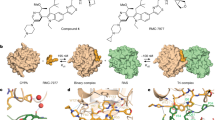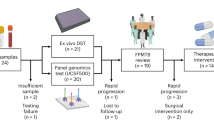Abstract
Background
Imatinib re-challenge is one of the available therapeutic options for patients with treatment-refractory gastrointestinal stromal tumours (GIST). Intermittent dosing of imatinib was suggested to delay outgrow of the imatinib-resistant clones in a preclinical study, and it could potentially reduce the adverse events.
Methods
A randomised phase 2 study was performed to evaluate the efficacy and safety of a continuous or intermittent imatinib schedule in GIST patients whose disease had progressed to at least imatinib and sunitinib.
Results
Fifty patients were included in the full analysis set. The disease control rate at 12 weeks was 34.8% and 43.5%, and median progression-free survival was 1.68 and 1.57 months in the continuous and intermittent groups, respectively. The frequency of diarrhoea, anorexia, decreased neutrophil, or dysphagia was lower in the intermittent group. The scores for global health status/quality of life was not significantly deteriorated over the 8 weeks in both groups.
Conclusions
The intermittent dosage did not improve the efficacy outcomes as compared to the continuous dosage, but showed slightly better safety profiles. Given the limited efficacy of imatinib re-challenge, intermittent dosage may also be considered in clinical circumstances where standard fourth-line agent is unavailable or all other viable treatments failed.
This is a preview of subscription content, access via your institution
Access options
Subscribe to this journal
Receive 24 print issues and online access
$259.00 per year
only $10.79 per issue
Buy this article
- Purchase on Springer Link
- Instant access to full article PDF
Prices may be subject to local taxes which are calculated during checkout


Similar content being viewed by others
Data availability
Not applicable.
References
Casali PG, Blay JY, Abecassis N, Bajpai J, Bauer S, Biagini R, et al. Gastrointestinal stromal tumours: ESMO-EURACAN-GENTURIS Clinical Practice Guidelines for diagnosis, treatment and follow-up. Ann Oncol. 2021. https://doi.org/10.1016/j.annonc.2021.09.005.
NCCN. National Comprehensive Cancer Network guideline, gastrointestinal stromal tumors (GISTs) (version 1.2021). Plymouth Meeting, PA: NCCN; 2021.
Koo DH, Ryu MH, Kim KM, Yang HK, Sawaki A, Hirota S, et al. Asian Consensus Guidelines for the Diagnosis and Management of Gastrointestinal Stromal Tumor. Cancer Res Treat. 2016;48:1155–66. https://doi.org/10.4143/crt.2016.187.
Demetri GD, von Mehren M, Blanke CD, Van den Abbeele AD, Eisenberg B, Roberts PJ, et al. Efficacy and safety of imatinib mesylate in advanced gastrointestinal stromal tumors. N Engl J Med. 2002;347:472–80. https://doi.org/10.1056/NEJMoa020461.
Blanke CD, Demetri GD, von Mehren M, Heinrich MC, Eisenberg B, Fletcher JA, et al. Long-term results from a randomized phase II trial of standard- versus higher-dose imatinib mesylate for patients with unresectable or metastatic gastrointestinal stromal tumors expressing KIT. J Clin Oncol. 2008;26:620–5. https://doi.org/10.1200/jco.2007.13.4403.
Blanke CD, Rankin C, Demetri GD, Ryan CW, von Mehren M, Benjamin RS, et al. Phase III randomized, intergroup trial assessing imatinib mesylate at two dose levels in patients with unresectable or metastatic gastrointestinal stromal tumors expressing the kit receptor tyrosine kinase: S0033. J Clin Oncol. 2008;26:626–32. https://doi.org/10.1200/jco.2007.13.4452.
Casali PG, Zalcberg J, Le Cesne A, Reichardt P, Blay JY, Lindner LH, et al. Ten-year progression-free and overall survival in patients with unresectable or metastatic GI stromal tumors: long-term analysis of the European Organisation for Research and Treatment of Cancer, Italian Sarcoma Group, and Australasian Gastrointestinal Trials Group Intergroup Phase III Randomized Trial on Imatinib at Two Dose Levels. J Clin Oncol. 2017;35:1713–20. https://doi.org/10.1200/jco.2016.71.0228.
Kim JH, Ryu MH, Yoo C, Chae H, Na H, Beck M, et al. Long-term survival outcome with tyrosine kinase inhibitors and surgical intervention in patients with metastatic or recurrent gastrointestinal stromal tumors: a 14-year, single-center experience. Cancer Med. 2019;8:1034–43. https://doi.org/10.1002/cam4.1994.
Demetri GD, van Oosterom AT, Garrett CR, Blackstein ME, Shah MH, Verweij J, et al. Efficacy and safety of sunitinib in patients with advanced gastrointestinal stromal tumour after failure of imatinib: a randomised controlled trial. Lancet. 2006;368:1329–38. https://doi.org/10.1016/s0140-6736(06)69446-4.
Demetri GD, Reichardt P, Kang YK, Blay JY, Rutkowski P, Gelderblom H, et al. Efficacy and safety of regorafenib for advanced gastrointestinal stromal tumours after failure of imatinib and sunitinib (GRID): an international, multicentre, randomised, placebo-controlled, phase 3 trial. Lancet. 2013;381:295–302. https://doi.org/10.1016/s0140-6736(12)61857-1.
Blay JY, Serrano C, Heinrich MC, Zalcberg J, Bauer S, Gelderblom H, et al. Ripretinib in patients with advanced gastrointestinal stromal tumours (INVICTUS): a double-blind, randomised, placebo-controlled, phase 3 trial. Lancet Oncol. 2020;21:923–34. https://doi.org/10.1016/s1470-2045(20)30168-6.
Honma Y, Kurokawa Y, Sawaki A, Naito Y, Iwagami S, Baba H, et al. Randomized, double-blind, placebo (PL)-controlled, phase III trial of pimitespib (TAS-116), an oral inhibitor of heat shock protein 90 (HSP90), in patients (pts) with advanced gastrointestinal stromal tumor (GIST) refractory to imatinib (IM), sunitinib (SU) and regorafenib (REG). J Clin Oncol. 2021;39:11524.
Kang YK, Ryu MH, Yoo C, Ryoo BY, Kim HJ, Lee JJ, et al. Resumption of imatinib to control metastatic or unresectable gastrointestinal stromal tumours after failure of imatinib and sunitinib (RIGHT): a randomised, placebo-controlled, phase 3 trial. Lancet Oncol. 2013;14:1175–82. https://doi.org/10.1016/s1470-2045(13)70453-4.
Wardelmann E, Merkelbach-Bruse S, Pauls K, Thomas N, Schildhaus HU, Heinicke T, et al. Polyclonal evolution of multiple secondary KIT mutations in gastrointestinal stromal tumors under treatment with imatinib mesylate. Clin Cancer Res. 2006;12:1743–9. https://doi.org/10.1158/1078-0432.Ccr-05-1211.
Liegl B, Kepten I, Le C, Zhu M, Demetri GD, Heinrich MC, et al. Heterogeneity of kinase inhibitor resistance mechanisms in GIST. J Pathol. 2008;216:64–74. https://doi.org/10.1002/path.2382.
Desai J, Shankar S, Heinrich MC, Fletcher JA, Fletcher CD, Manola J, et al. Clonal evolution of resistance to imatinib in patients with metastatic gastrointestinal stromal tumors. Clin Cancer Res. 2007;13:5398–405. https://doi.org/10.1158/1078-0432.Ccr-06-0858.
Heinrich MC, Maki RG, Corless CL, Antonescu CR, Harlow A, Griffith D, et al. Primary and secondary kinase genotypes correlate with the biological and clinical activity of sunitinib in imatinib-resistant gastrointestinal stromal tumor. J Clin Oncol. 2008;26:5352–9. https://doi.org/10.1200/jco.2007.15.7461.
George S, Wang Q, Heinrich MC, Corless CL, Zhu M, Butrynski JE, et al. Efficacy and safety of regorafenib in patients with metastatic and/or unresectable GI stromal tumor after failure of imatinib and sunitinib: a multicenter phase II trial. J Clin Oncol. 2012;30:2401–7. https://doi.org/10.1200/jco.2011.39.9394.
Serrano C, Mariño-Enríquez A, Tao DL, Ketzer J, Eilers G, Zhu M, et al. Complementary activity of tyrosine kinase inhibitors against secondary kit mutations in imatinib-resistant gastrointestinal stromal tumours. Br J Cancer. 2019;120:612–20. https://doi.org/10.1038/s41416-019-0389-6.
Grunewald S, Mühlenberg T, Rubin B, Schuler MH, Fletcher JA, Bauer S. Effect of secondary KIT mutations on growth of GIST cells in the absence of selective pressure by imatinib in isogenic models of imatinib resistance. J Clin Oncol. 2014;32:10555.
Aaronson NK, Ahmedzai S, Bergman B, Bullinger M, Cull A, Duez NJ, et al. The European Organization for Research and Treatment of Cancer QLQ-C30: a quality-of-life instrument for use in international clinical trials in oncology. J Natl Cancer Inst. 1993;85:365–76. https://doi.org/10.1093/jnci/85.5.365.
Yoo C, Ryu MH, Nam BH, Ryoo BY, Demetri GD, Kang YK. Impact of imatinib rechallenge on health-related quality of life in patients with TKI-refractory gastrointestinal stromal tumours: Sub-analysis of the placebo-controlled, randomised phase III trial (RIGHT). Eur J Cancer. 2016;52:201–8. https://doi.org/10.1016/j.ejca.2015.10.071.
Shah MA, Wainberg ZA, Catenacci DV, Hochster HS, Ford J, Kunz P, et al. Phase II study evaluating 2 dosing schedules of oral foretinib (GSK1363089), cMET/VEGFR2 inhibitor, in patients with metastatic gastric cancer. PLoS ONE. 2013;8:e54014.
Dréno B, Kunstfeld R, Hauschild A, Fosko S, Zloty D, Labeille B, et al. Two intermittent vismodegib dosing regimens in patients with multiple basal-cell carcinomas (MIKIE): a randomised, regimen-controlled, double-blind, phase 2 trial. Lancet Oncol. 2017;18:404–12. https://doi.org/10.1016/s1470-2045(17)30072-4.
Hussain M, Tangen CM, Berry DL, Higano CS, Crawford ED, Liu G, et al. Intermittent versus continuous androgen deprivation in prostate cancer. N Engl J Med. 2013;368:1314–25. https://doi.org/10.1056/NEJMoa1212299.
Algazi AP, Othus M, Daud AI, Lo RS, Mehnert JM, Truong TG, et al. Continuous versus intermittent BRAF and MEK inhibition in patients with BRAF-mutated melanoma: a randomized phase 2 trial. Nat Med. 2020;26:1564–8. https://doi.org/10.1038/s41591-020-1060-8.
Faber E, Nausová J, Jarosová M, Egorin MJ, Holzerová M, Rozmanová S, et al. Intermittent dosage of imatinib mesylate in CML patients with a history of significant hematologic toxicity after standard dosing. Leuk Lymphoma. 2006;47:1082–90. https://doi.org/10.1080/10428190600565057.
Son MK, Ryu MH, Park JO, Im SA, Kim TY, Lee SJ, et al. Efficacy and safety of regorafenib in korean patients with advanced gastrointestinal stromal tumor after failure of imatinib and sunitinib: a multicenter study based on the management access program. Cancer Res Treat. 2017;49:350–7. https://doi.org/10.4143/crt.2016.067.
Raut C, Van Den Abbeele A, Ramaiya N, Morgan J, George S, Quigley M, et al. Patterns of PET response after long-term sunitinib therapy in patients (pts) with imatinib (IM)-resistant gastrointestinal stromal tumors (GIST). J Clin Oncol. 2006;24:9547.
Acknowledgements
The study drug was supplied by HK inno.N Corp. This study was presented in part at the ASCO Annual Meeting 2022.
Funding
None.
Author information
Authors and Affiliations
Contributions
Study concepts: YKK; data acquisition: H-DK, CY, M-HR and Y-KK; quality control of data and algorithms: H-DK, CY, M-HR and Y-KK; data analysis and interpretation: H-DK, CY, M-HR and Y-KK; statistical analysis: H-DK, CY, M-HR and YKK; manuscript preparation: H-DK and Y-KK; manuscript editing: H-DK, CY, M-HR and Y-KK; manuscript review: H-DK, CY, M-HR and Y-KK.
Corresponding author
Ethics declarations
Competing interests
There are no competing interests directly related to this work. Out of this work, Y-KK has served as a consultant for ALX Oncology, Zymeworks, Amgen, Novartis, Macrogenics, Daehwa, Blueprint, Surface Oncolgy, BMS, Merck (MSD). M-HR received honoraria from DAEHWA Pharmaceutical, Bristol Myers Squibb, Lilly, Ono Pharmaceutical, MSD, Taiho Pharmaceutical, Novartis, Daiichi Sankyo and AstraZeneca, and served as a consultant for DAEHWA Pharmaceutical, Bristol Myers Squibb, Lilly and Ono Pharmaceutical. CY received honoraria from Servier, Bayer, AstraZeneca, Merck Sharp & Dohme, Eisai, Celgene, Bristol Myers Squibb, Debiopharm, Ipsen, Kyowa Kirin, Novartis, Boryung Pharmaceuticals, Merck Serono, Mundipharma, Roche, and Janssen, and received research grants from Servier, Bayer, AstraZeneca, Ono Pharmaceuticals, Celgene, Ipsen, Boryung Pharmaceuticals, Ildong Pharmaceuticals, CKD Pharmaceuticals, and HK inno.N.
Ethics approval and consent to participate
The protocol of this study was approved by the Institutional Review Board of Asan Medical Center and it was conducted in accordance with the ethical principles of the Declaration of Helsinki and within the Good Clinical Practice Guidelines, as defined by the International Conference on Harmonization. All patients provided written informed consent before enrolment. This study was registered with clinicaltrial.gov (NCT 02712112).
Consent for publication
Not applicable.
Additional information
Publisher’s note Springer Nature remains neutral with regard to jurisdictional claims in published maps and institutional affiliations.
Supplementary information
Rights and permissions
Springer Nature or its licensor (e.g. a society or other partner) holds exclusive rights to this article under a publishing agreement with the author(s) or other rightsholder(s); author self-archiving of the accepted manuscript version of this article is solely governed by the terms of such publishing agreement and applicable law.
About this article
Cite this article
Kim, HD., Yoo, C., Ryu, MH. et al. A randomised phase 2 study of continuous or intermittent dosing schedule of imatinib re-challenge in patients with tyrosine kinase inhibitor-refractory gastrointestinal stromal tumours. Br J Cancer 129, 275–282 (2023). https://doi.org/10.1038/s41416-023-02269-z
Received:
Revised:
Accepted:
Published:
Issue Date:
DOI: https://doi.org/10.1038/s41416-023-02269-z



